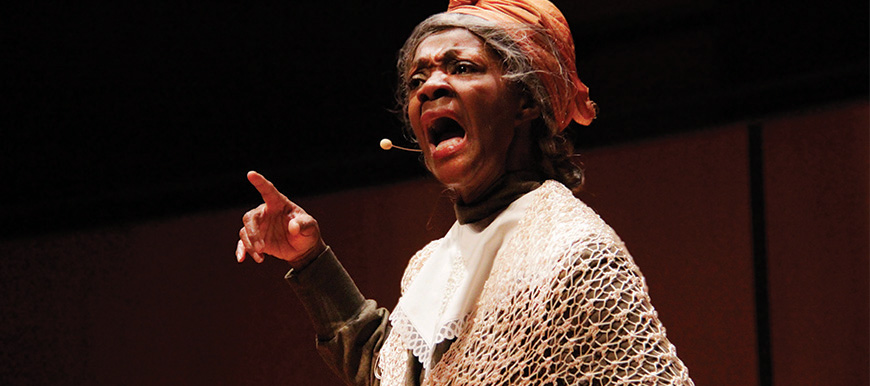‘Traveling shoes’ aims to educate
Eight stories, eight pairs of shoes lining the edge of the stage, eight costumes. One woman, one show.
This show was not a performance merely meant to entertain. It was meant for education. It was storytelling.
Janice Brooks, a former CEO and currently a professional storyteller, took on the role of eight different historical African American women in her show “Traveling Shoes,” which she performed Thursday at Utah State University.
The show was part of the Provost’s Series on Instructional Excellence in celebration of Black History Month. The show was sponsored by Utah Public Radio and the Center for Women and Gender.
Sojourner Truth, Barbara Jordan, Harriet Tubman, Rosa Parks, Shirley Chisholm, the Buffalo Soldier Cathay Williams and Utah pioneers Biddy Mason and Jane Manning came to life as Brooks shared their memories, history and choices — as them.
“The show — it’s educational. It’s also a shared history, not a white history or a black history but shared for us to remember,” said Brooks.
This is one thing audience-member Clara von Dohlen enjoyed about the show.
“Right now there’s a lot of ‘Black Live Matters’ and stuff in the news, and I think it’s interesting how little of that is being focused on here and how it’s about all of us,” von Dohlen said. “Each of us, women, everyone — (the show) is about us all.”
Von Dohlen, the daughter of a biology professor at USU and a student at Macalester College in Minnesota, said she believed this type of show is what people need to help deal with everything in the news about Brown and Ferguson.
“I think she should go national. … This is exactly the kind of peace-bringing people need,” said von Dohlen.
Her mother, Carol von Dohlen thought the show was “incredibly inspirational and educational.”
“I’m just amazed so much by these women,” Carol said. “I mean, I lived through some of these — Shirley Chisholm and Barbara Jordan. I was a teenager, and I just didn’t appreciate it at the time how ground-breaking they were.”
Brooks made sure everyone in the audience knew about the strength each of the eight women.
Brooks said she believed there are many details of each of these women’s lives that people are unaware of. Part of what she wanted from the show was for people to walk away educated and empowered by the example of the women and finer points of their stories.
Brooks personally researched, wrote and prepared the entire show over a number years, but it first debuted at Dixie State University in March. Soon after, word got out, and universities across the state were asking Brooks to come and do the show for them.
“I have to reinforce I’m not an actress. … I am a storyteller. I break the fourth wall,” Brooks said. “And some of it is delivered very organic. … I can get into a woman on stage, but sometimes I don’t know how I’ll get out. … I do it with the audience. I change what I say. There are parts in the show that I have planned, and others that are just open to see where it goes. … We’re in this together.”
Throughout the show, Brooks engaged the audience through song, snapping and encouragement of the different characters. As Rosa Parks sat on the bus and sang “Amazing Grace,” the audience sang along. After Brooks told about Shirley Chrisholm, the first African American woman elected to serve in Congress who was “unbought and unbossed,” the audience was invited to tip their hats off to her.
“Storytelling — it’s almost like a stew pot. I have menus, facts of life, and I’ve got to make a soup. It won’t ever taste the way that it did before. This is what keeps it on storytelling,” Brooks said.
Brooks said she hopes that the audience “will come away inspired, take something into their own life. I want it to return a spark or reinforce an idea.”
As she shared segments of Barbara Jordan’s famous 1976 Democratic Convention keynote address, Brooks hoped that the words, “The American idea, though it is shared by all of us, it is realized by each of us,” would penetrate hearts in this day.
For Brooks, it has always been about learning — learning about others, the past and the history that shapes every person’s life. Her motive in doing the show is that it will teach and motivate change.
“If I could use one word, it would be inspiration. It inspires someone to do something, to be something,” Brooks said. “So this show is not meant to entertain. It is not just for entertainment.”
Brooks said she hopes to get a humanities grant soon, so a playwright can take what she has written of the show and develop a new one that can then be authorized and used for high school performances.
For more on Janice Brooks, visit https://medium.com/shero-stories/an-soulful-anthem-b9025da5571a.
— mandy.m.morgan@aggiemail.usu.edu

